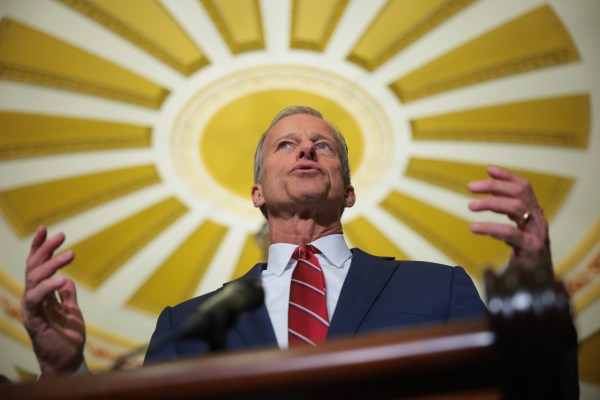Hello and happy Saturday. We were ready for just about anything for the election. We published a guide to swing state election laws and procedures, Tuesday’s Morning Dispatch laid out when polls closed and explained when to expect results. The Dispatch Politics team talked to both Republicans and Democrats about how they’d feel if their side lost. Our fact checkers had sourced up with contacts for state election officials in case we had anything like a repeat of 2020 and its maelstrom of misinformation and baseless election challenges. We had prepared for the election to go on for days, however it might turn out.
After what happened four years ago and the craziness of the current campaign, I’m not sure anyone was ready for what was, by some measures, a normal election night. The Associated Press called the election for former President Donald Trump at 5:34 a.m. ET, but the result had been clear for hours by that point. Kamala Harris won the usual blue states but trailed in all seven swing states.
Trump’s victory, though, made it an unusual election by other measures. He’s the second president to have won nonconsecutive turns, but the first one to have been convicted of a felony. His win likely means the end of the other legal cases against him. Trump will be greeted at the White House on January 20, 2025, by outgoing President Joe Biden, the man who defeated him four years ago and whose inauguration he did not attend—after claiming for months he himself was the rightful winner.
The Democrats, meanwhile, are grappling with the fallout from losing to Trump for a second time. In 2016, his victory over Hillary Clinton was a surprise, and Clinton won the popular vote. Democrats could blame the billions of dollars of free media attention that networks granted the upstart and incendiary Trump, and complain about how the Electoral College benefits Republicans. This time, Trump and his, um, complicated legacy were a known quality, and yet he won the popular vote.
In fact, as we noted in TMD, the Republicans could end up with a trifecta—Trump in the White House and GOP control of both the House and the Senate. As of Saturday morning, 23 House races remain uncalled. The GOP will control the Senate, but a few races are outstanding there, too, and “the Senate’s relationship with a Trump White House could hinge on the size of their majority,” TMD writes.
In his newsletter (🔒), Chris Stirewalt ran through the exit polls and found that “voters in all demographic groups were fed up with the Biden administration.” He considers the role that the immigration crisis—as well as potential sexism—played but reaches a simpler conclusion. “I think what we had was a fundamentals election, not a vibes election. Voters were unhappy with the party in power and turned them out.”
The election results surprised many, but not Kevin. He’d suggested, even before Joe Biden’s disastrous debate performance and again afterward, that the Democrats drop Harris. Well, they didn’t, and here we are. He’s not expecting them to take his advice this time, but he has some—and it takes the form of a math lesson. “There are more non-Hispanic whites in the United States than every other group put together—about 60 percent of the population,” he writes. “There are a lot more Americans without a college degree than Americans who have one. And, while women make up a small majority of voters, there aren’t that many young, white, liberal, college-educated, unmarried suburban female professionals out there. Progressives should learn to count.”
The Democrats will spend the next few months wondering how they might have propelled Harris to victory and pointing fingers as to whose fault it is that she lost to a twice-impeached convicted felon who instigated a riot at the Capitol in response to his 2020 loss and that the campaign has nothing to show after spending $1 billion. But in Boiling Frogs (🔒), Nick’s ire is directed at those who voted for Trump:
Americans reelected a man described by his own former advisers as a fascist, having already witnessed how willing he is to abuse presidential power toward fascist ends and understanding that returning him to office will immunize him legally for those abuses. … And they did so overwhelmingly. Never in U.S. history has the public chosen leadership this malevolent this decisively. The moral clarity of their decision is crystalline, particularly knowing how Trump will regard his margin as a “mandate” to do his worst.
Jonah is no more enthused about Trump’s victory than Nick, but he cautions against reading too much into it—and in particular against assigning a candidate’s worst attributes to his or her followers. In the Friday G-File, he writes:
Saying that a Latino mechanic in Philly who voted for Trump magically became a fascist the moment he filled the oval for someone you think is a fascist is magical thinking. And if you’re a Democrat who wants to win back that mechanic in 2028, calling him a fascist isn’t going to get you very far. Persuading him that he was wrong is a much more fruitful avenue.
To break the fourth wall for a moment, I’ll admit it was a little weird to write this newsletter. Donald Trump won a free and fair election by a convincing margin, and our job at The Dispatch is to report on that. But we have written about Trump’s lack of fitness for the office since he was president the first time. Some journalists have responded to Trump’s victory with anger and apoplexy—the Guardian has reportedly offered counseling to employees upset by the election result. But our personal feelings about the result are irrelevant. What matters is that we are cognizant that Trump has proposed a mass deportation of illegal immigrants that would, if implemented, play out in an ugly fashion. He’s proposed extreme tariffs that would upend our economy. He’s vowed retribution against his political foes, and he’s less likely than last time to have advisers and staffers who can curb his worst impulses. His second term will present challenges to our institutions and society writ large. We will report on and analyze his actions with open eyes, but we will do without an agenda. In short, we’ll keep doing what we’ve always done: We’ll be straight with you.
Thanks for reading and have a good weekend.
And here’s the best of the rest.
- Elections tend to render moot a lot of what was written ahead of them, but we ran a few pieces ahead of Tuesday that are still worth your time. In Dispatch Faith, Bonnie Kristian wrote about how we can all still get along after the results. In The Monday Essay, Michael P. Zuckert argued that Abraham Lincoln’s second inaugural address—“With malice toward none; with charity for all; with firmness in the right, as God gives us to see the right, let us strive on to finish the work we are in”—offers a way forward on the divisions we face. And Steve reported from Wisconsin on whether January 6 would end up mattering in the election. We know that result, but the comments he got from voters are worth revisiting.
- Greg Lukianoff, president and CEO of the Foundation for Individual Rights and Expression, offers up his prescription for treating the ailing condition of free speech on our college campuses: Schools should be recruiting scholars, not activists.
- Hezbollah has named Naim Qassem to replace the slain Hassan Nasrallah as its leader, and Charlotte reports on his first address. “The speech’s threatening message invoked the fiery style” of his predecessor, she writes, “But its subdued delivery, from Nasrallah’s soft-spoken successor, raised questions about Qassem’s fitness to lead the Lebanon-based terrorist group.”
- Now that the election is over, it’s time to get back to the business of governing. In Techne, Will has some suggestions about how Congress can lead on artificial intelligence and antitrust.
- And the pods! On Advisory Opinions, David and Sarah review the legal cases against Trump and what might happen to them, and they also discuss potential justices Trump could name to the Supreme Court. In the solo Remnant, Jonah runs through some of the mistakes that the Harris campaign made. On The Dispatch Podcast, the gang talked about—what else?—the election and how Harris lost.










Please note that we at The Dispatch hold ourselves, our work, and our commenters to a higher standard than other places on the internet. We welcome comments that foster genuine debate or discussion—including comments critical of us or our work—but responses that include ad hominem attacks on fellow Dispatch members or are intended to stoke fear and anger may be moderated.
With your membership, you only have the ability to comment on The Morning Dispatch articles. Consider upgrading to join the conversation everywhere.